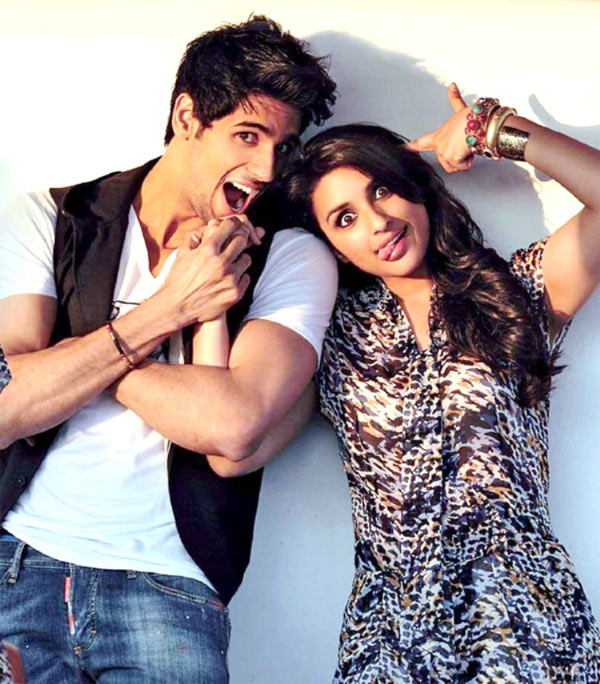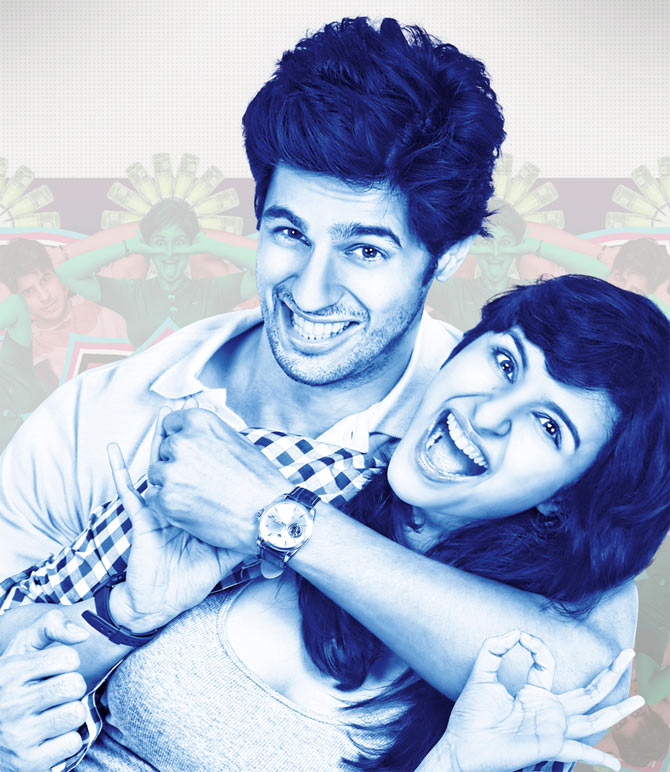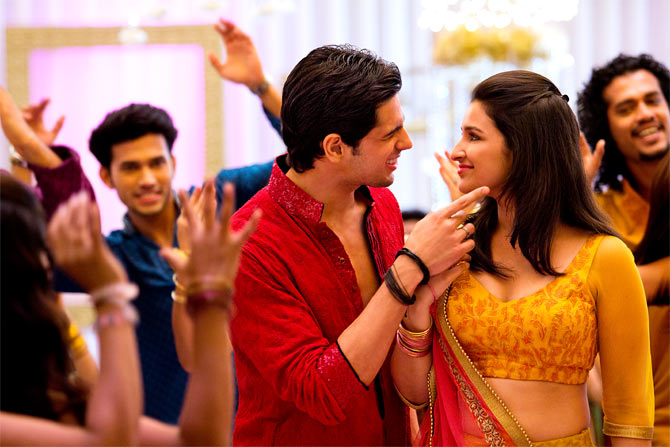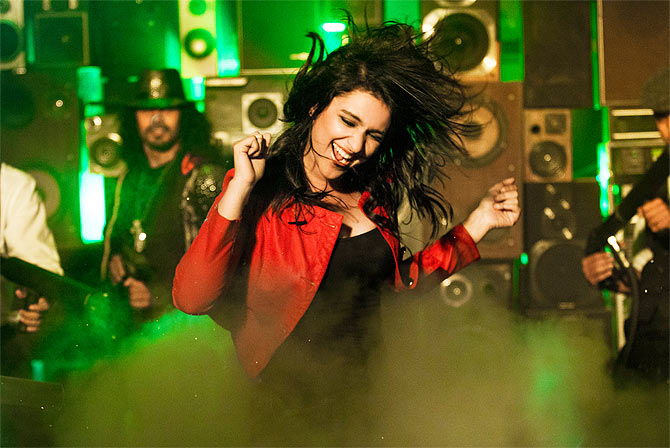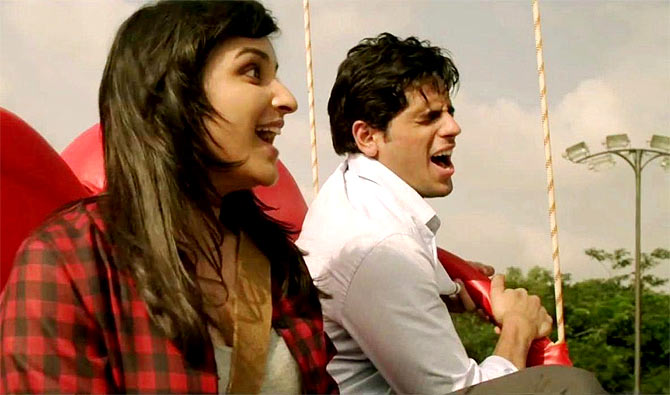 | « Back to article | Print this article |
'Parineeti Chopra is a big drama queen'
'My parents wanted me to become an economist but I decided to join FTII and become a director instead.'
Director Vinil Mathew gets ready for his first film, Hasee Toh Phasee.
After directing more than 250 commercials, Vinil Mathew is all set to make his directorial debut with Hasee Toh Phasee, with Siddharth Malhotra and Parineeti Chopra in the lead.
Vinil talks to Sonil Dedhia about his journey from advertising to Bollywood, how he got Karan Johar and Anurag Kashyap to produce his film, and why he calls Parineeti a big bully.
You have four big names -- Karan Johar, Anurag Kashyap, Vikramaditya Motwane and Vikas Bahl -- as producers of your film. It's a great start to your directorial career.
I’ve known all of them from the beginning. But, yes, I’m fortunate that all these people believed in me and decided to come together.
At the same time, there is also pressure to deliver. It is great to get two contrasting schools of cinema (referring to Karan Johar and Anurag Kashyap) together to back your film.
 As you say, Anurag and Karan represent different kinds of cinema. Didn’t that confuse you about what kind of film you should make?
As you say, Anurag and Karan represent different kinds of cinema. Didn’t that confuse you about what kind of film you should make?
In terms of the philosophy, they are very different.
There were times when I wanted a song and Phantom Production would say, why do you want to add songs, and Karan is, like, you have to shoot an elaborate song sequence.
But all the people involved as producers are also directors and they understood my requirements.
Karan was helpful in the finest of details. He also helped me a lot with the music.
Anurag helped me with the dialogues. Although I had to chase him a lot, he has added a lot of humour to the film.
Please click Next to see more.
'I am a sucker for rom-com films'
The film has a very unusual title. How much does it reflect in the story?
The title of the film catches the fun and quirky elements in the film, but I don’t think the philosophy of the film is reflected in the title.
Personally, I am a sucker for rom-com films and love watching them. My writer Harshwardhan Kulkarni and I felt that of late we have seen very typical films in this genre.
Making a film in this genre is very tough as there are only two possible outcomes: either the couple falls in love or they don’t.
In my young days when I watched these films, I would fall in love with the heroines and think about them for a week. Some years back, guys would be afraid to approach a girl. Having a girlfriend was the biggest thing.
I think these things are missing from our films. We have tried to bring freshness to the film where we have shown the craziness and the mushiness that was missing in our romantic films.
'I learnt that you should never work with your wife!'
Was it tough for you personally to talk to a girl or find a girlfriend?
(Laughs) It was relatively easy as I married my girlfriend.
I met my wife Shweta at the FTII (Film and Television Institute of India). She was my junior and we fell in love in three days but got married after 10 years. Today, she is the editor of my film.
Were there arguments with your wife while editing the film?
We had a lot of domestic conflicts and I learnt that you should never work with your wife (laughs).
Jokes apart, Shweta has edited many of the commercials that I have shot. We know each other’s requirements. Although we both have very strong opinions, she respects the fact that I am the director and eventually it’s my call.
It’s also great because she worked really hard and she knew the script from the time we wrote it.
'Parineeti has an incredible comic timing'
How was it working with Parineeti Chopra?
Parineeti is a big drama queen. She is a clown and I wanted a character like her in my film.
She has an incredible comic timing. On the sets, she is always buzzing and doing something or the other. She is full of energy; I needed someone like her to pull off the role.
She is an extremely quirky actress and you would not like to catch her on the wrong side on a bad day. She was always on my wish list but it wasn’t easy to convince her.
Initially she rejected the film. A few days later Karan approached her and she agreed to do the film. She is a big bully. She would pull anyone and everyone’s leg on the sets, but in a fun way. The entire cast and crew missed her if she was not on the sets even for a day.
Was Siddharth Malhotra cast because he has a three-film deal with Dharma Productions?
I don’t think it was an imposition. When you read the script, the film looks like a heroine-centric film but there is much more to it.
Siddharth is the surprise factor in the film. Once we had Parineeti on board, Karan suggested Siddharth’s name.
This was even before Student Of The Year (SOTY) released. I wasn’t sure about him. I told Karan that he was completely opposite to the kind of character I wanted in my film.
Karan requested me to meet Siddharth casually. I met him and we tested each other through the conversation and I realised he had a lot to offer.
'Siddharth will be seen in a completely different avatar'
Why do you say Siddharth is the surprise factor?
Siddharth will be seen in a completely different avatar than in SOTY.
It was a great opportunity for me to explore his potential and present him in a way the audience doesn’t expect.
I told him to shed his six-pack abs and presented him in a de-glam role. I gave him very ordinary clothes to wear, messed up his hair and made him look like a normal guy.
After being a successful ad filmmaker, was feature filmmaking the obvious next step?
Yes, I always wanted to be a feature filmmaker but I was clear I would do it only when I had a proper story to tell and a reasonable amount of experience.
I have wanted to be in films since my school days. I saw Mani Ratnam’s Roja and read an interview in which he said it was time educated people came into cinema and changed it. That’s when I decided to do something in this industry.
'My parents wanted me to become an economist'
You mentioned in an interview that you didn’t have the support of your parents when you decided to join this industry.
Yes. They wanted me to become an economist. I had cleared the Delhi School of Economics entrance exam but I decided to join FTII.
They weren't really happy with my decision. But I pursued what I wanted to do.
From making 30-second advertisements to a full-length feature film, was the transition easy?
It’s very difficult to make a feature film. You need a lot of persistence and patience.
Being an ad filmmaker gives you an edge while making a film. One has the sensibility to get the audience’s attention as they tell a story in 30 seconds.
People around you are a lot more comfortable and confident working with you if you have previously worked in the same medium.
